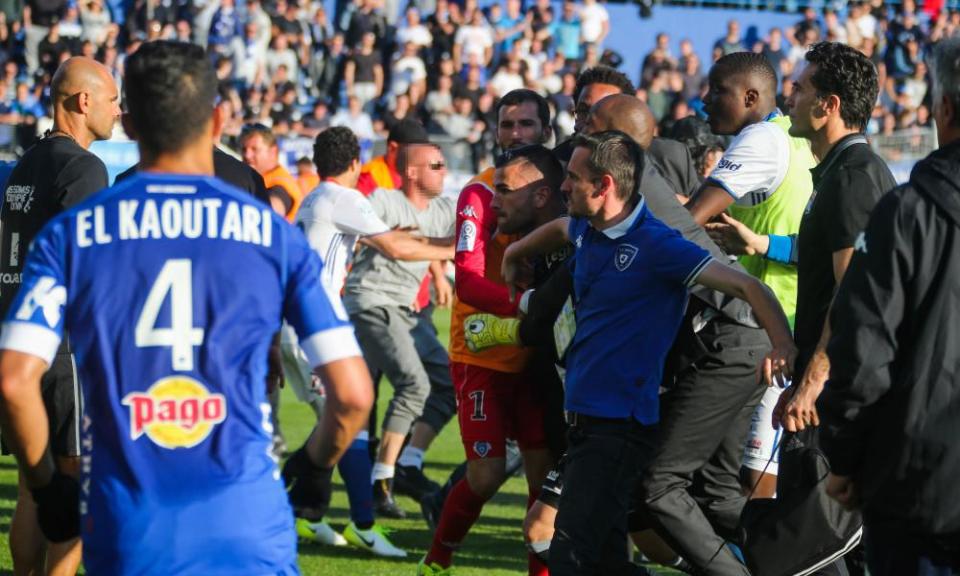Bastia, the Corsican club with an insatiable appetite for self-destruction | Barry Glendenning

Official retribution for the ugly scenes that led to the abandonment of Sporting Club de Bastia’s French league match against Lyon two weeks ago was swift and will almost certainly get more brutal. Corsica’s only top-flight club are bottom of Ligue 1 and members of the Bastia 1905 ultra group may have sealed the club’s descent into the second tier by twice attacking assorted Lyon players before the game was called off. Bastia were ordered to play Saturday’s home game against Rennes behind closed doors at the neutral Stade Parsemain in Fos‑sur‑Mer on the French mainland, where they maintained their hopes of survival with a 1-0 win over the Breton side. However, further sanctions – including a likely points deduction – will soon be announced, and the section of Bastia’s Stade de Furiani that houses away fans has also been closed indefinitely.
The less-than-warm welcome afforded Lyon’s players is far from the only blot on the Bastia hardcore’s copybook in a season repeatedly marred by trouble. During their opening match, Paris Saint‑Germain’s Lucas Moura was hit by an object thrown from the crowd while preparing to take a corner. More recently the club were sanctioned when the Nice striker Mario Balotelli was racially abused by home fans. In a season when the breathtaking attacking splendour of Monaco has helped win the French league no end of new admirers, the top flight’s comparatively poverty-stricken basement dwellers seem intent on repulsing these same people with attacks of a more violent kind.
It hasn’t always been this way. In the 1977-78 Uefa Cup, Bastia beat Sporting Lisbon, Newcastle United, Torino, Carl Zeiss Jena and Grasshopper Zürich en route to a two-leg final in which victory over PSV Eindhoven proved a step too far but the home game was made into a film by Jacques Tati. Three years later, they secured a trophy with a 2-1 French Cup final win over a Saint-Étienne team featuring Michel Platini, with the famous Cameroon international Roger Milla scoring their winner.
Like many other football clubs, they have also been touched by tragedy. On 5 May 1992 a temporary stand erected at their Furiani stadium to accommodate extra supporters for a cup semi-final against Marseille collapsed shortly before kick-off, killing 18 people and seriously injuring many more. It was later proven in court that grasping club executives were responsible for the catastrophe. As a mark of respect, Bastia no longer play matches on 5 May. This year, that particular date falls just a few days before the club are due to discover just how harsh their punishment for the violence against Lyon will be.
It is important to reiterate that these troublemakers represent a minority of Bastia fans, albeit a sizeable one. Many of their fellow supporters have long been appalled by their antics. Bastia’s rise in the 1970s coincided with the emergence of the sometimes violent Corsican nationalist movement, which has led the club to become a symbol of the fight against la métropole. In the first round of French league matches played after the Paris terrorist attacks of November 2015, Bastia entertained their more cosmopolitan but less successful rivals GFC Ajaccio in a Corsican derby and a giant banner reading “Ripuaste in Pace” (Rest in Peace) was spread across the pitch before a minute’s applause and a rendition of La Marseillaise. Despite Corsica’s fractious relationship with the French government, the national anthem was not drowned out by jeers similar to those that had greeted it before the 2002 French Cup final. The reason for this respectful silence? Members of Bastia 1905 refused to enter the stadium until after it was played.
While a lack of investment, poor performances and the prospect of relegation have not helped lighten the increasingly toxic mood at the Stade de Furiani, these identity issues and an often derided inferiority complex are perceived to fuel Bastia 1905’s appetite for self-destruction. The Moor’s head borrowed from the flag of Corsica features on the Bastia club badge and has come to symbolise the outsider status in which this increasingly infamous faction of their supporters revel. In the flag’s original incarnation, the bandana around the Moor’s head covered his eyes but it was moved upwards by the Corsican leader Pasquale Paoli to symbolise his people’s liberation. Although Bastia 1905 are far from the only troublemakers to occasionally bring French football into disrepute, their club’s hierarchy has previously been accused of turning a blind eye to their antics and affording them a sense of entitlement that could soon reach a very abrupt end. In the face of appalling publicity following the attacks on Lyon’s players, the club announced measures intended to put a stop to the hooliganism that has stained their season, including a stadium ban for anyone identified as having been involved. Criminal charges are also expected to be brought against those identified from TV footage, with anyone found guilty facing three-to-five years in jail.
“The Sporting Club of Bastia and the vast majority of its supporters refuse to be held hostage by a minority of people and will fight in order to preserve the values of the club and the place that is its among the elite,” declared a club statement, which made all the right noises even if some found it unconvincing. The feeling among the majority of Bastia fans, those who booed and whistled the pitch invaders who have landed their troubled club in so much hot water, is that it is too little too late; the sound of a stable door being slammed shut long after the occupant has bolted.

 Yahoo Sports
Yahoo Sports 